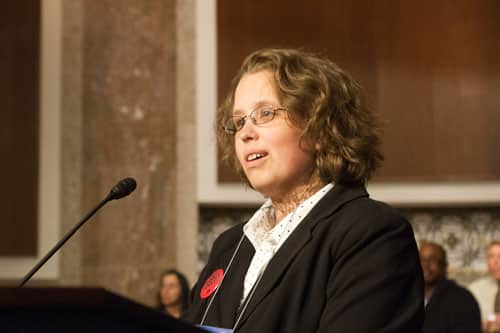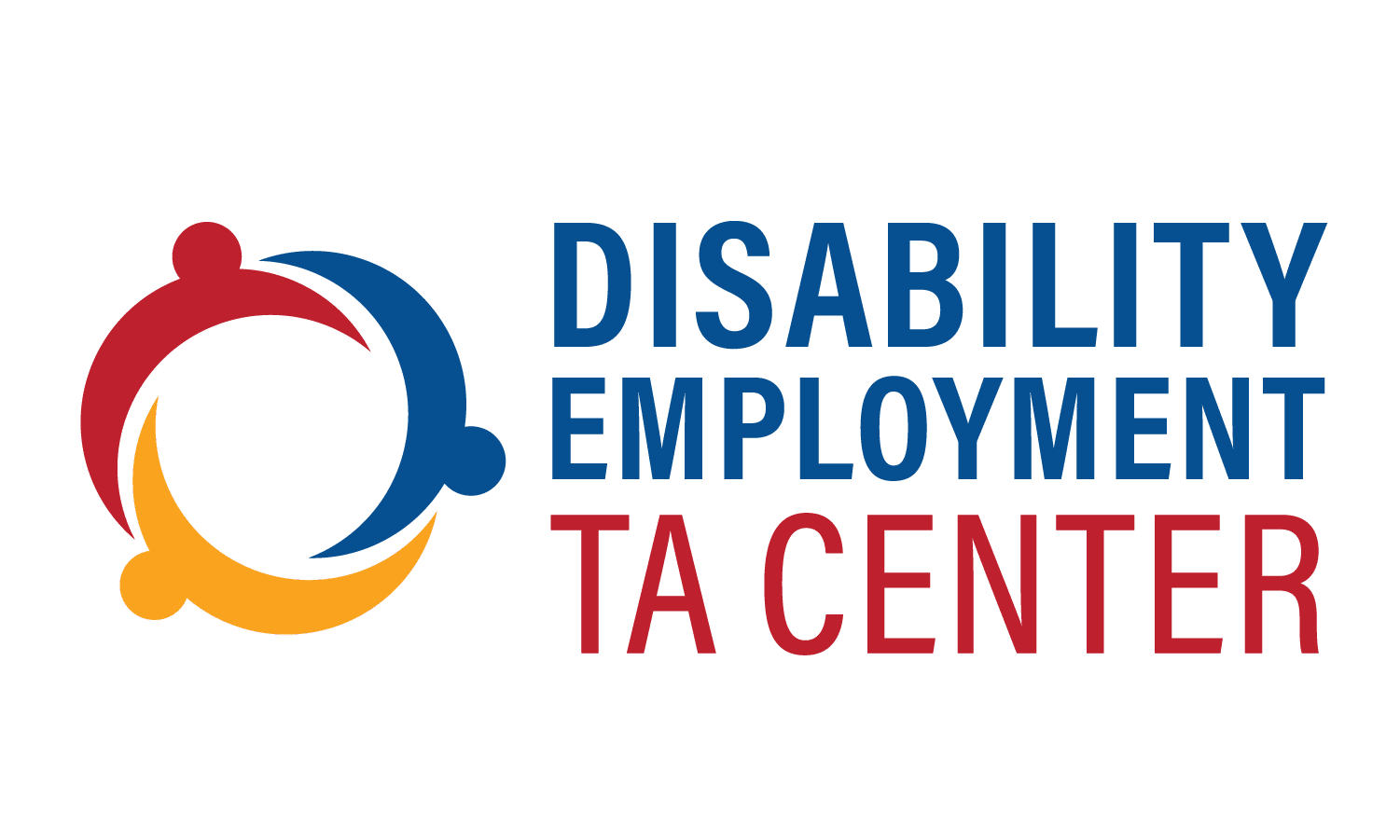
My name is Nicole LeBlanc, and I’m the self-advocate engagement consultant with the AoD Disability Employment TA Center and a disability advocate. I was diagnosed at an early age as having a non-verbal learning disorder, attention deficit disorder (ADD), and an intellectual/developmental disability (I/DD), and then later was diagnosed with autism at age 21. So, I know first-hand about some of the barriers that young people with disabilities face in entering the workforce. However, employment is a huge part of our identity in America, and the gateway to independence and full community inclusion. It was really important to me, like any other young person, to try and find work that I enjoyed based on my interests, strengths and passions.
During my high school years, I got my first job at a local ice rink where I did things like supervising skaters on the rink, shoveling snow, cleaning various spaces, selling skate rentals and snacks, and making sure all skaters signed in and paid the fees for skating. Prior to getting this job, I had spent countless hours at the ice rink from age 13 to 15. After finally learning how to skate at 15, I was eager to get a job working at an ice rink. So, I went to the town clerk’s office and filled out the application and interviewed with the Recreation Director, who happened to be a former elementary school teacher I knew. A few days later, I got a call to tell me that I had gotten the job. I started working that winter for a pay of $6.25/hour. At the same time I was working at the ice rink, I also attended a Vocational Incentive Program, where I did odd jobs at school and got paid subminimum wages. In that program, my tasks included completing technical program attendance sheets, delivering mail, and helping out at a local preschool program. While I enjoyed performing these duties, I felt devalued being paid subminimum wages for my hard work.
Soon after that, my parents helped me get a job at Shaw’s Supermarket as a bagger; however, that experience did not go so well because it wasn’t a good fit with my skills and strengths. In that job, I bagged groceries and collected carts. One of the major challenges many of us with autism have is difficulty interacting with customers and being overly social or conversational. Because of this, I was someone who found it hard asking random folks how they were doing and trying to make small talk. To make things worse, I had a boss at the time who was hard-nosed and not very understanding of my disability. This job wasn’t a good fit for me and caused me a lot of stress, because it required me to do things that I found challenging and uncomfortable and I didn’t have someone to coach me or provide me with encouragement or support I needed. One day, it got so bad that I had an autism energy release where I started crying, got a terrible stomachache and ran to the deli to call my mother to help intervene. If there is one thing I learned from this, it is that I don’t do well working with people who are hard-nosed, rigid, emotionally unsupportive or unaccommodating.
I then went on to participate in Jobs Corps, and around the same time I also moved in with a shared living provider. A few years later, I got a job at Green Mountain Self Advocates (GMSA), a statewide self-advocacy organization for people with developmental disabilities. At GMSA, I worked on an initiative funded by a Violence Against Women Accessing Safety grant. The goal of the project was to support disability providers to become more trauma sensitive. In addition to making domestic and sexual violence programs more accessible in dealing with abuse and violence that people with I/DD and deaf people experience. As time went on and they saw my strengths, my role was expanded to doing legislative advocacy on behalf of the organization. This is where I really blossomed and found my professional passion! By engaging in legislative advocacy, I developed a reputation as the “Budget Watchdog” and “Guardian of Inclusion” in the Vermont Statehouse and among local media outlets. Everytime the Governor or state legislature proposed cuts to disability services, I was there to sound the alarm amongst our members and give them an earful. Inclusion is a birthright, not a privilege! In 2012, I was promoted to the role of Advocacy Director after I graduated from the UVM Howard Center SUCCEED program with a certificate in general studies. That same year, I also completed an internship at the Administration on Intellectual & Developmental Disabilities under the former Commissioner Sharon Lewis.
In the last four years, I have completed numerous policy internships, fellowships and other gigs at various organizations to gain experience in disability policy. Currently, I serve as the PAL Group Coordinator for the National Center on Advancing Person Centered Practices. On top of that, I also serve as the Self-Advocate Engagement Advisor for the TASH AoD Disability Employment Technical Assistance Center.
My dream job has always been to be a policy analyst or policy director for a national disability rights organization. Our society needs to do more to create policy roles for self-advocates, especially when it comes to influencing public policy that directly affects our lives. We must do more to address the lack of diversity and ableism that exists in our society in the disability rights nonprofit world and the general workforce. In addition we also need to focus on expanding work incentives that can allow people with disabilities to earn more and not worry about losing benefits.
Living and working with a disability can often feel like a full- time job in itself. It can be exhausting because of all the limits, barriers, and obstacles that are placed on us.
One thing that has played a role in my success is the support of allies, and coming from a family where there was always the expectation that I would work just like anyone else without a disability. The biggest obstacles I continue to face is ableism, and not having access to job development and ongoing job coaching supports that many people with significant disabilities need. Vocational Rehab should offer long- term job coaching and be more person-centered in supporting us to achieve our dream jobs. We must move away from just sticking people with disabilities in any old job and expect them to succeed when the job may be a terrible fit and not take into consideration their individual skills, interests, and strengths.
Like everyone else I know, employment has been a core part of my adult experience, and I hope the guide will encourage other young adults to go after their career goals despite running into some bumps in the road. People with disabilities are typically underestimated, and yet much more resilient than people without disabilities, because we have had to overcome people’s low expectations and negative attitudes toward us for a very long time. My advice is use this inner strength to mow over the shallow obstacles that are out there to the workforce. Control your own destiny — or someone else will.

